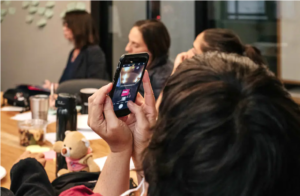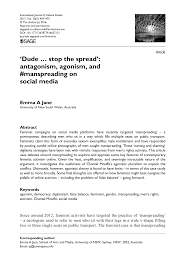Role of Emotions, Sentiments & Affect In Digital Culture
Scholars & Thought Leaders
Sameer Hinduja
Sameer Hinduja is recognized internationally for his groundbreaking work on cyberbullying, sexting, and social media abuse, concerns that have paralleled the exponential growth in online communication by young people. Sameer seeks to intersect social science and computer science to arrive at innovative strategies and solutions to some of the major online issues plaguing society today, including cyberbullying, trolling, toxicity, sextortion, hate speech, threats, and digital self-harm.
- Connecting Adolescent Suicide to the Severity of Bullying and Cyberbullying (2018)
- Bullying Beyond the Schoolyard: Preventing and Responding to Cyberbullying(2015)

Sherry Turkle
Sherry Turkle is the Abby Rockefeller Mauzé Professor of the Social Studies of Science and Technology in the Program in Science, Technology, and Society at MIT, and the founding director of the MIT Initiative on Technology and Self. Professor Turkle writes on the “subjective side” of people’s relationships with technology, especially computers. She is an expert on culture and therapy, mobile technology, social networking, and sociable robotics.

Munmun De Choudhury
Munmun De Choudhury is an Associate Professor (with tenure) in the School of Interactive Computing at Georgia Tech. At Georgia Tech, Choudhury leads the Social Dynamics and Wellbeing Lab (SocWeB Lab). The lab studies, analyzes, and appropriates social media, responsibly and ethically, to derive computational, large-scale data-driven insights, and to develop mechanisms and technologies for improving our well-being, particularly our mental health.
- Artificial Intelligence for Mental Healthcare: Clinical Applications, Barriers, Facilitators, and Artificial Wisdom. (2021)
- Characterizing and predicting postpartum depression from shared Facebook data. (2014)
- Munmun De Choudhury : “Employing Social Media to Improve Psychiatric Treatment Outcomes” (2018)
- Social Media as a Measurement Tool of Depression in Populations (2013)
- The Interaction Hour: Can Social Media Unlock Clues to Mental Health (2018)

Patricia Clough
Patricia Ticineto Clough is professor of Sociology and Women’s Studies at the Graduate Center and Queens College of the City University of New York. Clough’s work draws on theoretical traditions concerned with technology, new media, affect, the unconscious, timespace and political economy. She is currently working on Ecstatic Corona an ethnographic, historical research and experimental writing project about where she grew up in Corona Queens New York .

Maya Samaha Rupert
Associate Professor of Computer Science at Notre Dame University – Louaize. Dr. Smaha Rupert holds a Ph.D. from the University of Lyon, France. She has been working with passion doing research on Internet and Technology Addiction and spreading awareness in the Lebanese community.

Emma A Jane
Dr Emma A. Jane (formerly Emma Tom) is an Associate Professor in the School of the Arts & Media at UNSW Sydney.Blockchain, cognitive enhancement, online misogyny, cyberbullying, cybercrime, digilantism, and digital mobs are the foci of her ongoing research into the social and ethical implications of emerging technologies. She also researches and publishes on transgender-related issues, as well as on issues relating to gender more generally. Emma’s work is interdisciplinary, informed by the fields of philosophy, cultural and media studies, internet studies, feminist and gender theory, discourse analysis, sociology, literary theory, and social psychology.

Film & Video
How Do Different Social Media Platforms Affect Your Mood? (2017)
Do a quick Google search on how social media affects your mood, and the results make it seem like all the social media platforms will plunge you into depression. Facebook shows everyone’s perfect life and exotic vacations. Expertly curated selfies abound on Instagram. But, if you look at the actual research, the results aren’t that simple.
Source: Above the Noise | PBS Digital Studios
Internet Trolls: Born That Way? (2018)
What type of people are Internet trolls? Several research studies have looked at trolling behavior and they have found that Internet trolls tend to have personality traits associated with the dark triad of personality traits, like psychopathy and machiavelianism. Host Myles Bess discusses why people participate in trolling and how trolling disproportionately affects women and people of color.
Source: Above the Noise | PBS Digital Studios
Is the Internet Making You Meaner? (2019)
If the Internet’s making you feel meaner, you’re not imagining it. People really do act differently online than they do in person. Here’s why. Why do people act differently online than they are in person? People aren’t always meaner online than in person, but according to the online disinhibition effect people can act differently online.
(Cyberbullying, harassment, comments about women’s bodies/appearance)
Source: Above the Noise | PBS Digital Studios
Harassment is breaking Twitter’s free speech experiment (2017)
Twitter started off as a radical free speech experiment, but widespread harassment is forcing the social media giant to rethink what kind of platform it wants to be.
Source: Vox
Why every social media site is a dumpster fire (2018)
Social media sites like Facebook, Twitter, and YouTube exploit our tribalism to keep us watching ads. That makes them a perfect target for trolls, conspiracy theorists, and con artists. People are naturally drawn to inflammatory and sensational news stories, regardless of whether or not they’re true. So bad actors — conspiracy theorists, trolls, and fake news writers — have been tremendously successful in using these platforms to spread false and divisive content that exploit people’s tribal instincts. The problem with these social media sites isn’t that a few bad apples are ruining the fun. It’s that they’re designed to reward bad apples.
Source: Vox
Is Social Media Hurting your Mental Health? (2017)
Scrolling through our social media feeds feels like a harmless part of our daily lives. But is it actually as harmless at seems? According to social media expert Bailey Parnell, our growing and unchecked obsession with social media has unintended long term consequences on our mental health.
The Stream – Hate speech v free speech: Where is the line? (2017)
On this episode of The Stream hosts investigate the role digital technology plays in propagating or shutting down online hate speech. Panelists from around the world gather for a virtual discussion about online hate speech and what obligation of companies have to set limits on free speech on their platforms.
Al Jazeera
(August, 2017)
Web Resources
What is online anti-LGBT + Hate speech and Hate crime?
This page answers questions for lesbian, gay, bisexual and trans (LGBT+) people about online hate speech and hate crime. You don’t have to know whether something you experienced was a crime to report it, though it can be useful to know what kinds of behaviour are against the law and which are not.
Galop, the LGBT+ anti-violence charity
Books & Articles
I’ve left Twitter. It is unusable for anyone but trolls, robots and dictators (2017)
Lindy West, writer and editor at The Guardian, discusses why she has decided to leave the Twitter online community after a decade. As West explains, on Twitter ” I am micromanaged in real time by strangers; neo-Nazis mine my personal life for vulnerabilities to exploit; and men enjoy unfettered, direct access to my brain so they can inform me, for the thousandth time, that they would gladly rape me if I weren’t so fat.”
Source: The Guardian
Why did the Washington Post ban a sexual assault survivor from reporting on rape
Moira Donegan, The Guardian, 2021
Online harassment of female journalists is real, and it’s increasingly hard to endure (2021)
Women journalists share their first-hand experiences with online harassment they have encountered as a result of doing their jobs. This harassment has included hate speech, sharing of private personal information, and threats of physical violence.
Margaret Sullivan,
The Washington Post
I’m Tired Of Watching Black Death Go Viral (2020)
Why must graphic videos of George Floyd and Ahmaud Arbery make the social media rounds in order for the public to care about their unjust deaths?
By: Author Danny Cherry Jr.
Source: BuzzFeed
Digital Cultures and the Politics of Emotion (2012)
This volume provides a fascinating dialogue that cuts across disciplines, media platforms and geographic and linguistic boundaries. Fifteen thought-provoking essays explore the tensions between cultural studies of affect, public feelings and the politics of emotion on the one hand, and digital culture, new media and information-communication technologies on the other.
Affective Publics: Sentiment, Technology, and Politics (2014)
By Zizi Papacharissi
Over the past few decades, we have witnessed the growth of movements using digital means to connect with broader interest groups and express their points of view. These movements emerge out of distinct contexts and yield different outcomes, but tend to share one thing in common: online and offline solidarity shaped around the public display of emotion.
Dude … stop the spread’: antagonism, agonism, and #manspreading on social media (2017)
By Emma A Jane
Feminist campaigns on social media platforms have recently targeted ‘manspreading’ – a portmanteau describing men who sit in a way which fills multiple seats on public transport. Feminists claim this form of everyday sexism exemplifies male entitlement and have responded by posting candid online photographs of men caught manspreading. These ‘naming and shaming’ digilante strategies have been met with vitriolic responses from men’s rights activists. This article uses debates around manspreading to explore and appraise some key features of contemporary feminist activism online.







